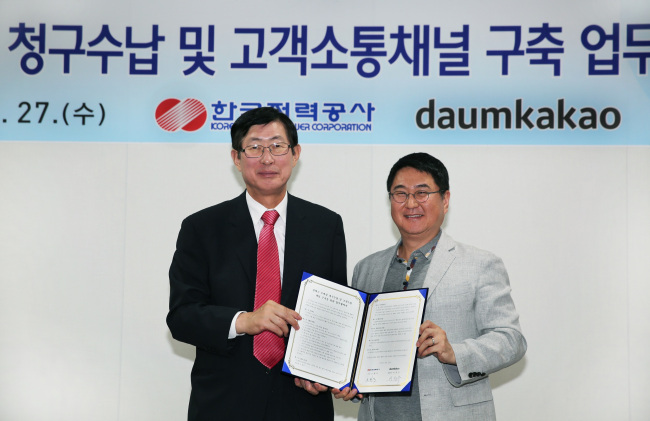In South Korea ― one of the strongest IT powerhouses in the world ― information and communication technology is increasingly taking on a bigger role in drawing the local energy and resource sectors closer to users.
The Korean government is actively cooperating with tech firms to make electricity monitoring and payments more convenient while also working to build new ICT-based infrastructure to provide households with real-time information regarding water use.
The state-run Korea Electric Power Corporation on Thursday signed a memorandum of understanding with Daum Kakao Corp. to develop a new fintech electronic payment system which will allow users to view their billing statements and make the necessary payments via KakaoTalk.
The Korean government is actively cooperating with tech firms to make electricity monitoring and payments more convenient while also working to build new ICT-based infrastructure to provide households with real-time information regarding water use.
The state-run Korea Electric Power Corporation on Thursday signed a memorandum of understanding with Daum Kakao Corp. to develop a new fintech electronic payment system which will allow users to view their billing statements and make the necessary payments via KakaoTalk.

The payment system is set to directly connect KEPCO with some 21.5 million electricity users through the nation’s No. 1 mobile app messenger ― currently used by roughly 90 percent of Korea’s smartphone owners.
“The new system seeks to replace paper bills ― which take days to be delivered to households ― with KakaoTalk. The app will allow users to conveniently check their bills and make payments at any time,” KEPCO said in a statement.
Meanwhile, the Ministry of Land, Infrastructure and Transport is looking to expand its “smart water management system” ― which utilizes ICT technology including smart sensors to efficiently monitor and distribute water resources ― across the nation.
The system was first tested out in Paju, Gyeonggi Province in 2014 with a population of roughly 3,700 people. On top of operating a water quality assurance program, the ministry released related information to the public via a smartphone app and public LED screens.
The move led to improved perceptions of public water, as satisfaction levels increased from 55 percent to 92.3 percent, according to a ministry survey of 1,500 Paju citizens. The number of people drinking public water also rose from 1 to 19.3 percent.
This year, Goryeong County in North Gyeongsang Province plans to implement a system that monitors not only water quality but also tracks household water usage in real-time in a move to immediately catch potential water pipe leaks and encourage water conservation.
“The Land Ministry plans to systematically expand the program every year in two to three small- and middle-sized cities,” said a ministry official.
“We will continue to further develop related technologies and raise public confidence in the safety of public water.”
By Sohn Ji-young (jys@heraldcorp.com)




![[Herald Interview] 'Amid aging population, Korea to invite more young professionals from overseas'](http://res.heraldm.com/phpwas/restmb_idxmake.php?idx=644&simg=/content/image/2024/04/24/20240424050844_0.jpg&u=20240424200058)











![[KH Explains] Korean shipbuilding stocks rally: Real growth or bubble?](http://res.heraldm.com/phpwas/restmb_idxmake.php?idx=652&simg=/content/image/2024/04/25/20240425050656_0.jpg&u=)

